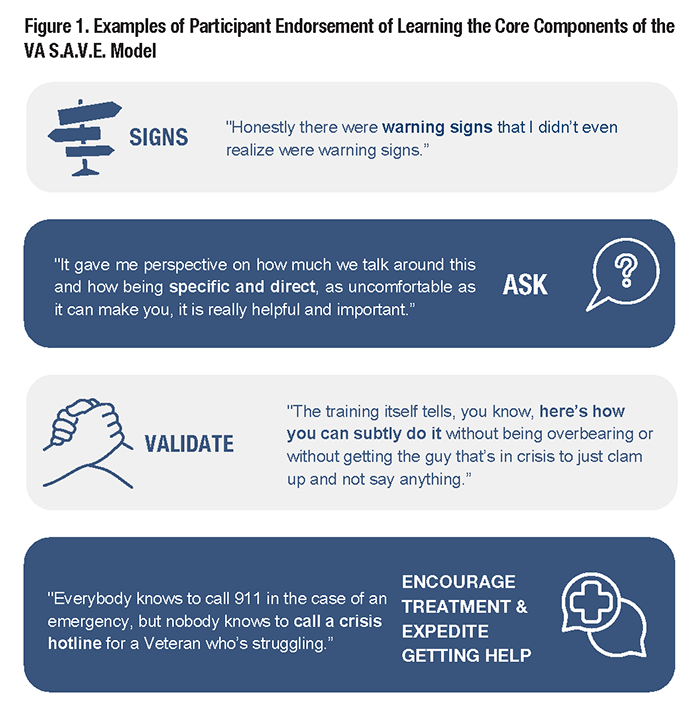
|
|
Research HighlightSuicide Prevention Training for Veterans' Family Members: Leveraging a Video-based Version of VA S.A.V.E.Key Points
Individuals experiencing suicidal ideation are more likely to share these thoughts with loved ones than a healthcare provider. This presents a clear opportunity for family and friends to play a role in suicide prevention. While supporting someone at risk for suicide can feel daunting for anyone, gatekeeper training helps prepare and empower people to help. What is Gatekeeper Training and VA S.A.V.E.?Gatekeeper training refers to a public health intervention strategy designed to teach individuals how to identify a person at risk of suicide and then assist the at-risk person in seeking professional mental health evaluation and treatment. “Gatekeeper” refers to the target recipient for the training and represents the family member or other close contact of the person at risk for suicide. VA S.A.V.E. (Signs; Ask; Validate; Encourage and Expedite) is a gatekeeper training that was developed by the Department of Veterans Affairs (VA) and is specifically tailored to Veterans. While the training is typically delivered in person, VA S.A.V.E. is also available in a brief, online video-based format that was developed in partnership with the education and training nonprofit PsychArmor. Brief video-based gatekeeper training holds significant appeal because it allows individuals to learn at their own pace and schedule, and it can be easier to scale and disseminate than in-person training. While there have been some studies of other brief video-based gatekeeper trainings, our project was the first to examine and evaluate the video-based version of VA S.A.V.E. What Did the Pilot of VA S.A.V.E. Find?We conducted a randomized controlled trial of the brief video-based version of VA S.A.V.E. To be eligible, participants had to have social contact with a Veteran at least once per week. We recruited participants through Facebook and randomized them to VA S.A.V.E. versus a video-based attention control condition. Participants completed follow-up surveys over six months. Those in the intervention group completed a 25-minute video training, with content that addressed myths and facts about suicide, components of the S.A.V.E. model, scenario-based vignettes, and suicide prevention and mental health resources. The S.A.V.E. model emphasizes four suicide prevention skills: learning Signs of suicide, Asking about suicidal thoughts, Validating Veterans’ experiences, and Encouraging help and Expediting treatment. A subgroup (n=15) of intervention group participants completed a follow-up interview. We used a mixed methods framework to integrate quantitative and qualitative findings. We published additional details on study procedures for interested parties. Findings from the pilot were very encouraging. First, recruitment exceeded our goals. We enrolled 214 participants representing 44 different states who completed baseline measures. Even more, we accomplished this in just 10 weeks during the heart of the pandemic in early 2021, thanks to our social media campaign and remote trial methods. Second, our intervention appeared acceptable to study participants, of whom 88 percent (n=189) were women and 61 percent (n=130) were the spouse or romantic partner of a Veteran. We examined engagement in the VA S.A.V.E. training by calculating the time spent on the VA S.A.V.E. training webpage. Most participants in the VA S.A.V.E. intervention group (67 percent) stayed on the webpage for the full length of the intervention, and on average they stayed on the webpage for 77 percent of the training’s duration. Survey measures of satisfaction and usability were also positive. Third, we observed some evidence of potential mechanisms of action for how the training might promote suicide prevention. Results showed that the intervention group had an increase in knowledge about suicide and an increase in positive social norms toward suicide prevention at six-month follow-up. Fourth, we explored changes in behaviors and skills related to suicide prevention, which are called gatekeeper behaviors. As a pilot study, we were not powered to determine whether changes were significant. Nonetheless, here again, we saw positive signs. Specifically, at six-month follow-up, compared to the control group, a higher proportion of the VA S.A.V.E. group reported using gatekeeper behaviors, such as directly asking a person about suicidal thoughts or providing concrete information on the Veterans Crisis Line (67-85 percent vs. 44-77 percent). Our interview data corroborated these preliminary trial findings, with participants feeling more confident in their suicide prevention skills and wanting VA S.A.V.E. to be shared widely. Participants also shared examples of applying what they learned. One participant said, “I’ve actually had conversations with my husband that I probably didn’t think I was ever going to have. It’s opened up doors to some conversations that I didn’t know that I would have or have been trying to figure out a way to have for a while and just couldn’t quite get there.” What are Next Steps in this Line of Work?This study is the first ever to evaluate a video-based version of VA S.A.V.E. among individuals recruited via social media who have regular social contact with a Veteran. Our results provide multiple indicators that VA S.A.V.E. is a promising brief suicide prevention training. There are also implications for future work that emerged from this pilot. Given our high rate of participation among spouses of Veterans, we believe VA S.A.V.E training may hold promise when delivered in settings and contexts popular among military and Veteran families. Indeed, VA S.A.V.E. training for caregivers for Veterans has been included within services offered through the Caregiver Support Program, and evaluation of this training is underway, as described in a recent issue of HSR&D FORUM. PsychArmor also has a video-based version of VA S.A.V.E. for caregivers that can be leveraged. Finally, we believe social media and digital spaces are vital and valuable avenues to share trainings such as VA S.A.V.E. 
References
|
|